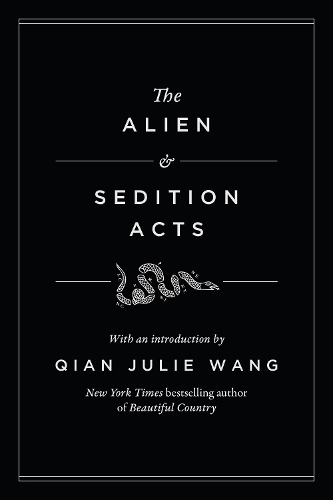
The Alien and Sedition Acts
(Hardback)
Publishing Details
The Alien and Sedition Acts
By (Author) Qian Julie Wang
Random House USA Inc
Modern Library Inc
25th November 2025
21st October 2025
United States
Classifications
General
Non Fiction
Physical Properties
Hardback
144
Width 127mm, Height 191mm
Description
New York Times bestselling author and civil rights lawyer Qian Julie Wang introduces the highly controversial Alien and Sedition Acts, which have been used to justify the curtailing of basic freedoms from the Revolutionary Era through the present day. New York Times bestselling author and civil rights lawyer Qian Julie Wang introduces the highly controversial Alien and Sedition Acts, which have been used to justify the curtailing of basic freedoms from the Revolutionary Era through the present day. In the summer of 1798, backed by President John Adams, the United States Congress passed a series of laws that would come to be known as the Alien and Sedition Acts, testing the limits of a Constitution barely a decade old. Passed in anticipation of an impending war with France, the three alien laws-the Naturalization Act, the Alien Friends Act, and the Alien Enemies Act-extended the waiting period for naturalization from five to fourteen years and authorized the detention and expulsion of aliens. The Sedition Act placed a federal ban on the publication of any anti-government writings. Objections were passionate and swift. The Kentucky Resolutions of 1798, penned by Vice President Thomas Jefferson, warned that the "friendless alien has been selected as the safest subject of a first experiment; but the citizen will soon follow." Yet while three out of the four laws were soon repealed or allowed to expire, the Alien Enemies Act is still in effect today. Though invoked sparingly, it was the basis for Japanese American internment during World War II-and for President Donald Trump's deportation of Venezuelan immigrants to a maximum security prison in El Salvador during the first 100 days of his second term. The questions raised by the Alien and Sedition Acts at the end of the 18th century-about immigration; the rights of the people in a time of war; the power of the government to define matters of national security; freedom of speech and freedom of the press-are still very much matters for concern and debate today. In her introduction to these founding documents, New York Times bestselling author and civil rights litigator Qian Julie Wang offers a vital perspective on the origins and long legal history of these ideas in the United States.
Author Bio
Qian Julie Wang is the author of the instant New York Times bestseller Beautiful Country- A Memoir of an Undocumented Childhood. A graduate of Yale Law School and Swarthmore College, she was formerly a commercial litigator and is now managing partner of Gottlieb & Wang LLP, a firm dedicated to advocating for education and civil rights. Her writing has appeared in publications such as The New York Times and The Washington Post. She lives in Brooklyn with her family.
